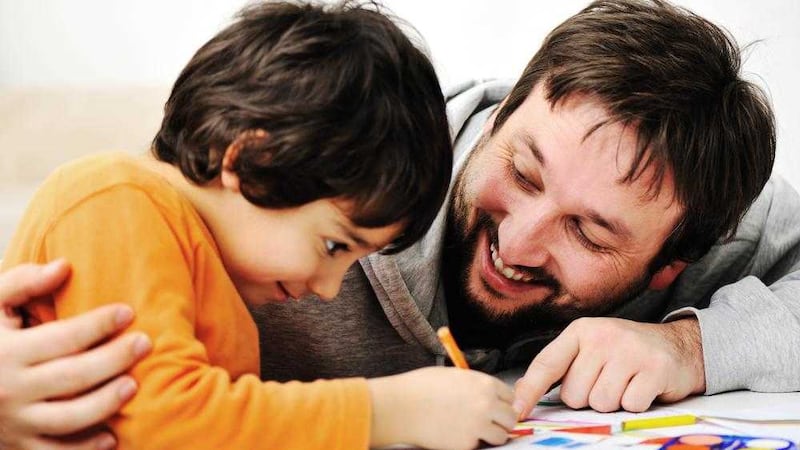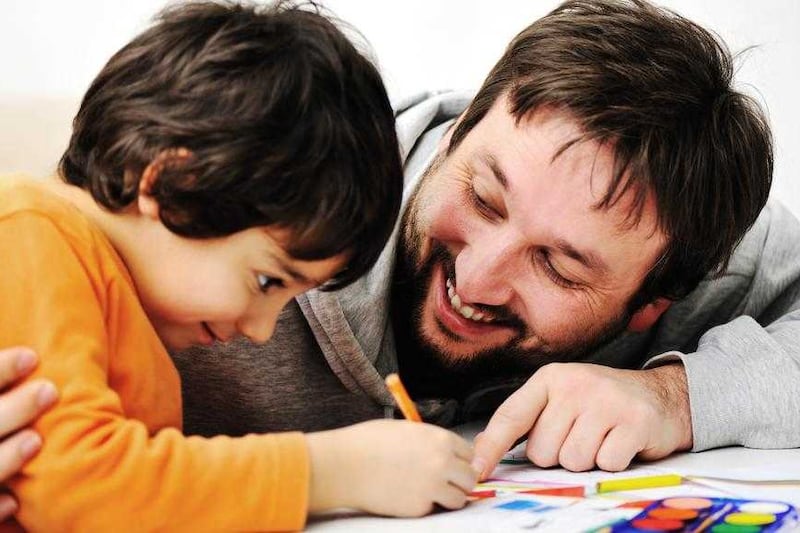FROM changing nappies, to building a fort, reading a bedtime story, playing football, taking their daughter to ballet, playing video games or simply chatting with their teenager "dads play a significant role in improving outcomes for children".
This is the message of Dads Direct, a group which aims to promote the value of actively engaged fathers in their children’s lives, whether they live with or apart from each other. Comprised of a number of representatives from Child Contact Centres, Family Mediation NI, Home-Start, Men’s Health Forum in Ireland, Parenting NI, Relate and Sure Starts, last autumn they published a briefing paper titled The Dad Factor – How Fathers Improve Child Outcomes, based on research collated by Queen's University's Dr Helga Sneddon.
The paper highlighted that children were losing out due to negative societal attitude and bias against fathers and recommended that co-parenting should be established as the norm.
Pip Jaffa, chief executive of Parenting NI is chairwoman of the Dads Direct group and passionate about having a father-figure actively engaged in the upbringing of children.
"It is concerning that current policy does not acknowledge the important role that fathers play and that service provision still tends to focus upon supporting mothers. Supporting fathers to be actively engaged in their children's lives from the start clearly leads to better outcomes for children and young people and is likely to save money on costly interventions later," she said.
Parenting NI regularly hold practical courses tailored to dads. And next month they will be hosting The Dad Factor, in Belfast and Derry, aimed at a wide-range of practitioners including health visitors, GPs, teachers, social workers and family support workers, to explore the role of dads and the challenges they face. The course will also explore how professionals can work to influence policies and practice to ensure fathers are supported to be actively engaged in their child's life.
"It's important to emphasise this is not a competition between dads and mothers. Ideally, both should be involved in the parenting of the children, whether they are together or not. But what research proves time and time again is that when dads are engaged and actively involved with their children, the outcome for children and young people is better," says Ms Jaffa.
"There are many single parents who do an excellent job bringing up children alone but there is added value when there is a father figure there. It may not the biological figure – it may be the grandfather, or uncle. Benefits of a father figure influence include the ability to form better friendship, fewer behavioural problems, a greater capacity for empathy and higher self-esteem. Confidence is particularly important when it comes to teens learning to say no in tricky situation's and helping them solve problems themselves."
Family structure have changed considerably over the past few decades, with statistics published by Relate in 2015 indicating that almost one in four people (24 per cent) have experienced the break-up of their parents' relationship.
Ms Jaffa emphasises that despite parents' own emotional turmoil during a break-up, they need to put their children first and aim to work at co-parenting.
"If the children's needs aren't attended to then down the line there is likely to be an impact on the children educationally and emotionally."
Males and females bring different qualities to parenting. While mothers tend to be more nurturing and worry about their children's safety, dads enjoy playing rough and tumble and also encourage their children to take risks, which is beneficial for their development.
Even within families where both parents are in a secure relationship, Ms Jaffa warns that dads need to be actively involved and dads should not use the excuse of being the 'breadwinner' and working excessive hours and spending little time with their children.
"We are a very isolated society now – even under one roof with mobile devices. The thing that children say to us over and over again about parents and grandparents is that they want more and more of their time. It doesn't take much effort or money to do something really enjoyable – even looking in a rock pool for grubs can be exciting. Children love fun and want to be happy and sometimes we are too busy we lose sight of what can enjoyable."
A DAD IS FOR LIFE
Some of the evidence that dads actively engaged with their families can a positive outcomes:
:: Fathers spending time reading to their one-to-two-year-olds is associated with a child’s increasing preference for books at school
:: A father’s interest in their child’s educational outcomes at age 10 can predict their level of educational achievement at age 26
:: Children who reported feeling that their fathers both like and understand them exhibit fewer behavioural problems, and say they have more positive friendships in adolescence than children who do not
:: Teenagers who have experienced an engaged and involved father are likely to have fewer behaviour problems, less criminality or contact with the police, and lower levels of substance abuse
:: How close a young person felt to their father at age 16 was found to predict these young people’s marital satisfaction and lower psychological distress at age 33



